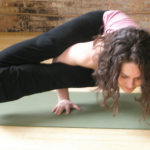 Type “benefits of yoga” into any search engine and you’ll find pages upon pages of articles. “Yoga: Tap into the many health benefits” from the Mayo Clinic, “The Benefits of Yoga” from the American Osteopathic Association, and “77 Surprising Health Benefits of Yoga” from the Nursing School Catalogue Yoga to list just three. The world and medical community are recognizing what yogis have always known. Yoga is good. In fact, it’s very good.
Type “benefits of yoga” into any search engine and you’ll find pages upon pages of articles. “Yoga: Tap into the many health benefits” from the Mayo Clinic, “The Benefits of Yoga” from the American Osteopathic Association, and “77 Surprising Health Benefits of Yoga” from the Nursing School Catalogue Yoga to list just three. The world and medical community are recognizing what yogis have always known. Yoga is good. In fact, it’s very good.
There are physiological benefits and psychological benefits. Blood pressure decreases. Cardiovascular, respiratory and circulatory efficiency increases. Endocrine function normalizes. Sleep, mood and well-being improve. Balance, posture, dexterity and even reaction times improve. Immunity function and strength increase. Pain, anxiety, depression and hostility decrease.
Yoga increases our body awareness which leads to subtle changes in our lives. Improved posture helps avoid neck, back and other muscular and joint problems. Yogis tend to take better care of themselves by eating healthier and making better daily choices. They are more relaxed, enjoy a sense of equanimity and can handle stressful situations without becoming overwhelmed.
Yoga helps you look younger by stimulating the detoxification process. Yogis not only look great but they also are comfortable in their own skin.
Yoga can improve your sexuality through better control, more relaxation, and more self- confidence. Ask a yogi about Mula Bandha and watch their knowing smile!
There are even biochemical benefits. Glucose, sodium, total cholesterol, and triglycerides decrease. Hemoglobin, lymphocyte count and vitamin C increase.
Yoga practice massages internal organs and improves the ability of the body to prevent disease. Studies have found that yoga can help prevent the following diseases:
| Heart Disease | Osteoporosis |
| Alzheimer’s | Type II Diabetes |
| Carpal Tunnel Syndrome | Asthma |
| Arthritis | Multiple Sclerosis |
| Cancer | Muscular Dystrophy |
| Migraines | Scoliosis |
| Chronic Bronchitis | Epilepsy |
| Sciatica | Obsessive Compulsive Disorder |
| Constipation | Allergies |
| Menopause | Back Pain |
An experienced yoga practitioner also becomes better attuned to their body to know at first sign if something isn’t functioning properly, allowing for quicker response to head off disease.
Yoga is low impact and involves controlled movements. It has a very low risk of injury compared to other forms of exercise. In many forms of exercise, the sympathetic nervous system kicks in, providing you with that fight-or-flight sensation. Yoga does the opposite, stimulating the parasympathetic nervous system. The parasympathetic system lowers blood pressure and slows the pace of your breathing, which allows relaxation and healing. That’s why yogis feel calmer yet more energized after class.
Yoga consumes less oxygen than traditional exercise routines, allowing the body to work more efficiently. Working the entire body, yoga improves endurance and is frequently used by endurance athletes as a supplement to their sport-specific training. The Chicago Bears may not be who comes to mind when you think of yogis, but even they practice yoga.
Yogis are more fit, energetic, happier and peaceful. What more could you want? This is why yogis practice yoga and why the rest of the world is starting to as well! How can yoga help you?

 Last Tweets
Last Tweets